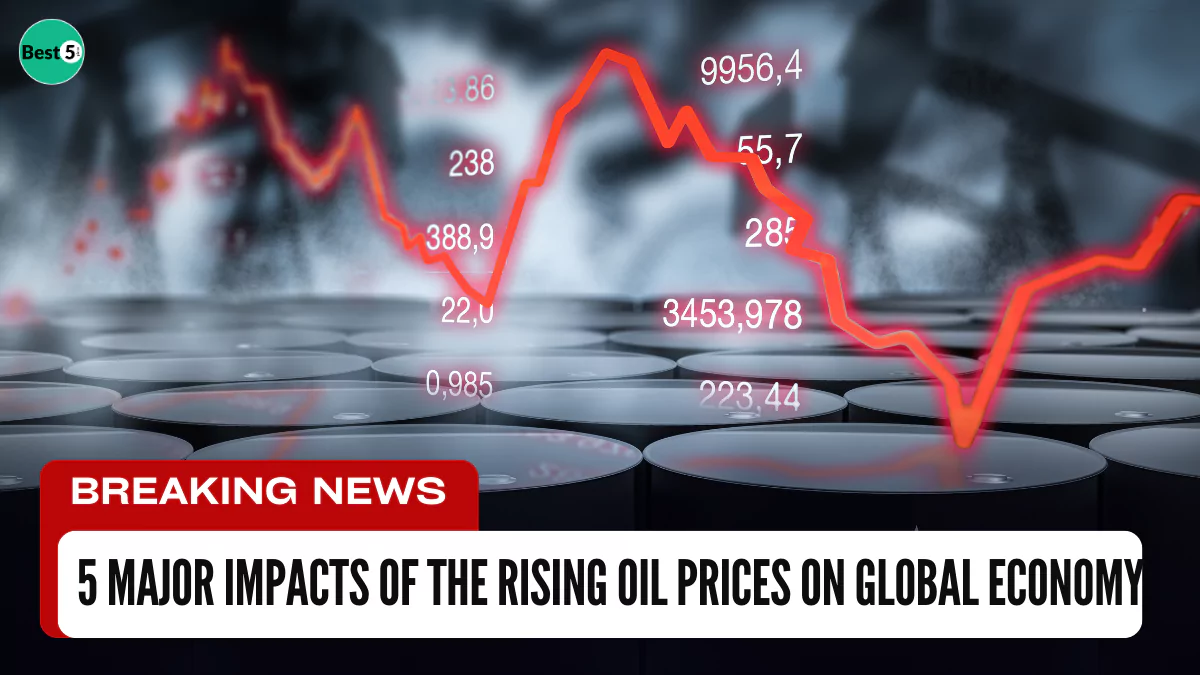The global economy is closely linked to energy markets, and oil remains one of the most important commodities driving trade, transportation, and industrial activities. In recent years, rising oil prices have become a central topic of concern for governments, businesses, and consumers alike. The impact of fluctuating oil prices is far-reaching, influencing everything from household budgets to international trade relations.
When oil prices climb, their effects ripple through multiple sectors. Higher energy costs affect manufacturing, transportation, agriculture, and even stock markets. Additionally, global inflation trends often mirror oil price changes, creating challenges for central banks worldwide. Understanding these impacts helps policymakers and businesses prepare strategies to manage economic risks.
In this article, we will explore 5 major impacts of the rising oil prices on the global economy, highlighting the key features and implications of each.
1. Rising Oil Prices and Global Inflation
Key Features:
- Directly increases the cost of goods and services.
- Impacts transportation, manufacturing, and supply chains.
- Pressures central banks to raise interest rates.
- Reduces consumer purchasing power.
- Influences emerging economies disproportionately.
Rising oil prices are one of the leading contributors to global inflation. As oil becomes more expensive, transportation costs surge, affecting the movement of goods across borders. This increase in logistics costs translates into higher prices for basic commodities, from food to electronics.
Manufacturing industries relying on petroleum-based products also face higher production costs. Central banks often respond by tightening monetary policies, raising interest rates to control inflation. However, this move can slow economic growth. Developing nations with weaker currencies suffer even more, as they spend more on oil imports, worsening trade balances.
2. Impact on Transportation and Logistics
Key Features:
- Increases fuel costs for airlines, shipping, and trucking.
- Raises freight charges and delivery prices.
- Disrupts global supply chains.
- Affects e-commerce and retail sectors.
- Reduces profitability for transport-based businesses.
The transportation industry is among the first to feel the impact of rising oil prices. Airlines face higher jet fuel costs, often leading to more expensive tickets for travelers. Trucking companies and shipping lines also experience increased operational expenses, resulting in higher freight charges.
Global supply chains become disrupted as businesses adjust shipping schedules or seek alternative transport methods. E-commerce platforms and retailers face higher logistics expenses, which may ultimately be passed on to consumers. Small businesses relying on affordable shipping face reduced profit margins, forcing some to rethink their business strategies.
3. Influence on Global Trade and Balance of Payments
Key Features:
- Alters import and export dynamics.
- Worsens trade deficits for oil-importing nations.
- Benefits oil-exporting countries’ economies.
- Impacts currency values and exchange rates.
- Shapes geopolitical relationships among nations.
Rising oil prices directly influence global trade flows. Oil-importing countries, such as India and Japan, experience increased import bills, which widen trade deficits. On the other hand, oil-exporting nations like Saudi Arabia and Russia see improved revenue streams, strengthening their economies and currencies.
Currency fluctuations often follow oil price changes, as nations adjust to shifting trade balances. The geopolitical landscape can also change, with oil-rich nations gaining more influence in international negotiations. This shift in power can reshape alliances and trade agreements, creating long-term economic and political consequences.
4. Effect on Consumer Spending and Business Growth
Key Features:
- Reduces disposable income for households.
- Increases operational costs for businesses.
- Slows economic growth in non-oil sectors.
- Influences investment decisions and hiring.
- Affects small and medium-sized enterprises disproportionately.
Consumers are among the hardest hit when oil prices rise. Higher fuel costs mean households spend more on transportation and energy bills, leaving less money for other expenses. This drop in disposable income weakens demand for non-essential goods and services.
Businesses face similar challenges. Increased operational costs can reduce profits, limit hiring, and delay expansion plans. Small and medium-sized enterprises are particularly vulnerable, as they have fewer resources to absorb cost increases. Slower consumer spending combined with reduced business investment can hinder overall economic growth.
5. Shaping Energy Transition and Policy Decisions
Key Features:
- Encourages investment in renewable energy.
- Prompts governments to revise energy policies.
- Accelerates research in alternative fuels.
- Encourages energy efficiency in industries.
- Highlights the need for energy security and diversification.
Rising oil prices often act as a catalyst for change. High energy costs push governments and companies to invest in renewable energy sources like solar, wind, and biofuels. Policymakers may introduce incentives for clean energy projects or impose stricter regulations on fossil fuel usage.
This transition also accelerates innovation in alternative fuels and technologies, from electric vehicles to hydrogen energy. Industries adopt energy-efficient practices to reduce costs and environmental impact. Ultimately, rising oil prices emphasize the importance of energy security, prompting nations to diversify their energy portfolios to avoid future economic shocks.
Conclusion – The Global Ripple Effect of Rising Oil Prices

The rising oil prices on the global economy are far more than a simple market fluctuation. They influence inflation, transportation, trade, consumer spending, and even environmental policies. These impacts demonstrate the interconnected nature of modern economies and the importance of strategic planning in uncertain times.
For businesses, adapting to higher oil prices means improving efficiency, exploring alternative energy options, and adjusting pricing strategies. Governments must balance short-term economic challenges with long-term sustainability goals. For consumers, understanding these effects can help make informed financial decisions during periods of volatility.
As oil remains a cornerstone of global energy, its price fluctuations will continue to shape economic trends and policies worldwide. By staying informed and proactive, stakeholders can better navigate the challenges posed by rising oil costs and ensure stability in a changing energy landscape.
Detailed Table of Major Impacts of Rising Oil Prices
| Impact Area | Key Effects | Affected Sectors | Long-Term Implications |
|---|---|---|---|
| Global Inflation | Higher goods and service prices, monetary tightening | Retail, manufacturing, finance | Slower growth, currency fluctuations |
| Transportation & Logistics | Increased freight charges, disrupted supply chains | Airlines, shipping, trucking | Higher consumer costs, supply chain adjustments |
| Global Trade & Balance of Payments | Worsened trade deficits for importers, stronger exporters | Import/export businesses, finance | Shift in geopolitical power, currency impact |
| Consumer Spending & Business Growth | Reduced disposable income, slower investments | Retail, SMEs, non-oil industries | Sluggish economic recovery, reduced demand |
| Energy Transition & Policy Decisions | Push for renewables, improved energy security | Renewable energy, government | Sustainable growth, reduced oil dependency |
FAQs about Rising Oil Prices on Global Economy
Why do rising oil prices affect the global economy so much?
Oil is a major energy source, so its price changes impact transportation, manufacturing, and trade worldwide.
How do rising oil prices lead to inflation?
Higher fuel costs raise production and shipping expenses, which increase consumer prices.
Which countries benefit most from rising oil prices?
Oil-exporting nations like Saudi Arabia, Russia, and the UAE benefit from higher revenues.
How do oil prices impact developing countries?
Developing countries face higher import bills, trade deficits, and inflationary pressures.
Can rising oil prices influence stock markets?
Yes, energy sector stocks often rise, while transport and manufacturing stocks may decline.
Do rising oil prices encourage renewable energy adoption?
Yes, higher oil prices often accelerate investment in renewables and alternative fuels.
What role do central banks play during rising oil prices?
Central banks may raise interest rates to control inflation, affecting borrowing costs.
How do oil prices affect currency exchange rates?
Importing countries’ currencies may weaken, while exporting nations’ currencies may strengthen.
Are rising oil prices always bad for the economy?
Not always; exporters benefit, and it can spur innovation in energy alternatives.
What can businesses do to cope with rising oil prices?
Businesses can improve efficiency, diversify supply chains, and consider alternative energy sources.








